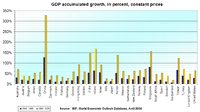
Photo from wikipedia
Abstract Worldwide accumulation of e-waste poses a major threat to environmental health. However, printed circuit boards contain precious metals, such as gold, and silver, and also contain micronutrient metal elements,… Click to show full abstract
Abstract Worldwide accumulation of e-waste poses a major threat to environmental health. However, printed circuit boards contain precious metals, such as gold, and silver, and also contain micronutrient metal elements, such as Fe, Cu, Zn, etc. Therefore, the present study investigated the effects of e-waste-tolerant bacteria (ETB) on promoting plant growth in e-waste-amended soils and mobilizing trace metals into the plants. For this, a total of 18 bacteria were isolated and screened for e-waste tolerance. Screening for plant growth-promoting properties revealed the production of indole-3-acetic acid-like compounds, siderophore production, and phosphate solubilization. Identification based on 16S rRNA gene sequencing revealed that all isolates belonged to the genus Bacillus. Pot experiment revealed that the treated seeds showed the enhancement of chili plants root growth ranging from 106.55 to 208.07% compared to control plants (e-waste) and 0.0 to 47.90% (without e-waste). A similar enhancement was also observed in the shoot length, and size of the leaf compared to e-waste amended control plants. Inoculation of ETB significantly (p < 0.05) mobilized Fe, Zn, Cu, and Ni into chili plants. The identified ETB could be used to mitigate the toxicity posed by the e-waste, enhancing plant growth and mobilization of micronutrients into plants from e-waste. Novelty Statement Bacillus species identified in this study are the potential e-tolerant (PCB) PGP bacteria. Inoculation of e-tolerant bacteria resulted in increased plant growth attributes and biomass index in e-waste amended soil. Bacterial inoculation also showed maximum uptake of Cu, Fe, Zn, and Ni from the e-waste amended soil. This study demonstrated that micronutrients can be fortified/mobilized from e-waste using PGP bacteria.
Journal Title: International Journal of Phytoremediation
Year Published: 2022
Link to full text (if available)
Share on Social Media: Sign Up to like & get
recommendations!